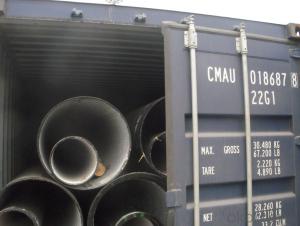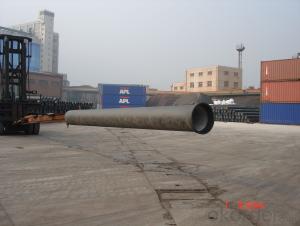DUCTILE IRON PIPES C Class DN1600
- Loading Port:
- China Main Port
- Payment Terms:
- TT OR LC
- Min Order Qty:
- -
- Supply Capability:
- -
OKorder Service Pledge
OKorder Financial Service
You Might Also Like
Ductile Iron Cast Pipe is without any defects compare with tradition casting tech, which has many advantages particularly as follow:
(1) High density. In the "vertical upward casting" process, the melt iron of centre liquid column in center crystallizer is continuously feeding for volume shrinkage caused by condensation tube at outer circumference , which lead to be free of shrinkage porosity.
(2) High purity. When melt iron pouring, the mixed impurities such as gas, dross, sand grain which are lighter than melt iron could be eliminated at furnace mouth, its impossible to enter into the crystallizer through the channel, so the melt iron into the crystallizer is very pure.
(3) Strength with toughness. The cooling speed provided by continuous crystallizer is 30 times than sand casting and 5 times than centrifugal casting, and doesn't produce white iron, the eutectic cell volume of continuous cast iron is one eighth to one tenth compare with traditional cast iron. The density of graphite nodule in ductile iron can reach 300-700 pcs/mm2. Therefore, all reason above improve the strength and toughness of continuous cast iron.
(4) Free machining. The high speed cooling make the hardening phase (such as boride, steadite) not appear like reticular, massive or thick, but diffuse like fish bone and pane in shape, moreover, there are tiny graphite flakes inlaid hardening phase. It's free machining in BrinellHardness the range of 250-300HB. However, the Brinell Hardness of 250 is top limit to common metal materials.
(5) Uniform composition of tube wall. The convection mixing of liquid column caused by marching type drawing in crystallizer make the composition of tube wall well-distributed, and concentration gradient very little.
(6) High productivity. To the wall thickness of tube under 10mm, the speed of continuous casting is 1 meter/min, to the wall thickness of tube under 20mm, the speed of continuous casting is 0.5 meter/min, which is high efficiency that centrifugal or other casting tech couldn't reach.
- Q:Are ductile iron pipes suitable for use in industrial applications?
- Yes, ductile iron pipes are suitable for use in industrial applications. They have excellent strength and durability, making them ideal for transporting water, chemicals, and other fluids in industrial settings. Ductile iron pipes are also resistant to corrosion, which is crucial for maintaining a long lifespan in industrial environments. Additionally, their flexibility and ease of installation make them a cost-effective choice for industrial applications.
- Q:What are the common methods for cutting ductile iron pipes?
- Cutting ductile iron pipes can be done using various methods, depending on the specific requirements and available tools. 1. For smaller diameter pipes, a hand saw with a carbide-tipped blade is commonly used. However, this method requires physical effort and can be time-consuming. 2. A more efficient option is using a reciprocating saw with a diamond or carbide abrasive blade. This power tool allows for faster cutting and requires less physical effort. 3. Another popular method is using a cut-off saw, also known as a chop saw or disc cutter. Equipped with a diamond or abrasive blade, this power tool provides precise and fast cuts, making it suitable for both small and large diameter pipes. 4. Cutting larger diameter ductile iron pipes can be achieved using a band saw with a bi-metal or carbide-tipped blade. This method allows for clean and precise cuts, but it may require specialized equipment and expertise. 5. In cases where other cutting tools are not available, a grinding wheel with a diamond or abrasive disc can be used for cutting smaller diameter pipes. It is crucial to follow proper safety precautions when cutting ductile iron pipes. This includes wearing appropriate protective gear and using clamps or vices to secure the pipe during cutting. It is also recommended to consult professionals or refer to manufacturers' guidelines for specific recommendations on cutting ductile iron pipes.
- Q:How does ductile iron pipe perform in areas with high ground movement?
- Ductile iron pipe performs well in areas with high ground movement due to its inherent flexibility and strength. Its ability to bend and absorb ground movements makes it less susceptible to cracking or breaking compared to other rigid pipe materials. Additionally, the material's high tensile strength and durability ensure that it can withstand the stresses caused by ground movement without compromising its structural integrity.
- Q:Can ductile iron pipes be used for irrigation pivot systems?
- Yes, ductile iron pipes can be used for irrigation pivot systems. Ductile iron pipes have high tensile strength and durability, making them suitable for handling the pressure and load requirements of irrigation pivot systems. Additionally, their corrosion resistance makes them a reliable choice for long-term use in such applications.
- Q:Can ductile iron pipes be used for slurry transportation?
- Yes, ductile iron pipes can be used for slurry transportation. Ductile iron pipes are known for their strength and durability, which makes them suitable for transporting various types of fluids, including slurry. They have the ability to withstand the abrasive nature of slurry and can effectively handle the pressure and flow requirements associated with slurry transportation.
- Q:Can ductile iron pipes be used in culvert or storm sewer applications?
- Yes, ductile iron pipes can be used in culvert or storm sewer applications. Ductile iron pipes are known for their strength, durability, and resistance to corrosion, making them suitable for handling the high demands and harsh conditions typically found in culverts and storm sewers.
- Q:Are ductile iron pipes suitable for sewage treatment plants?
- Yes, ductile iron pipes are suitable for sewage treatment plants. Ductile iron pipes are known for their durability, strength, and corrosion resistance, making them ideal for handling the corrosive and abrasive nature of sewage. They can withstand high pressure and are capable of accommodating heavy loads and ground movements, making them a reliable choice for sewage treatment facilities. Additionally, their smooth interior surface minimizes friction, reducing the risk of clogs and improving the flow of wastewater.
- Q:Can ductile iron pipes be used for stormwater management systems?
- Indeed, stormwater management systems can utilize ductile iron pipes. Renowned for their robustness and lastingness, ductile iron pipes prove fitting for diverse purposes, including stormwater management. These pipes exhibit resistance against corrosion and possess the ability to endure immense pressure, rendering them perfect for transporting stormwater runoff. Moreover, ductile iron pipes boast an extended lifespan, thereby minimizing the necessity for frequent replacements and upkeep. All in all, when it comes to stormwater management systems, ductile iron pipes serve as a dependable option.
- Q:Why is the sound speed of nodular cast iron lowered after heat treatment?
- After the heat treatment, the microstructure of the material changes, the graphite changes, eliminating the internal stress of molecules, thus slowing down the speed.
- Q:Ductile iron pipe connection mode
- Jack painted on the outer surface and rubber lubricant: lubricant evenly installed ring inner surface, outer surface coating in the socket to socket socket parts lubricant line all the brush in the socket.
1. Manufacturer Overview |
|
|---|---|
| Location | |
| Year Established | |
| Annual Output Value | |
| Main Markets | |
| Company Certifications | |
2. Manufacturer Certificates |
|
|---|---|
| a) Certification Name | |
| Range | |
| Reference | |
| Validity Period | |
3. Manufacturer Capability |
|
|---|---|
| a)Trade Capacity | |
| Nearest Port | |
| Export Percentage | |
| No.of Employees in Trade Department | |
| Language Spoken: | |
| b)Factory Information | |
| Factory Size: | |
| No. of Production Lines | |
| Contract Manufacturing | |
| Product Price Range | |
Send your message to us
DUCTILE IRON PIPES C Class DN1600
- Loading Port:
- China Main Port
- Payment Terms:
- TT OR LC
- Min Order Qty:
- -
- Supply Capability:
- -
OKorder Service Pledge
OKorder Financial Service
Similar products
New products
Hot products
Related keywords



























